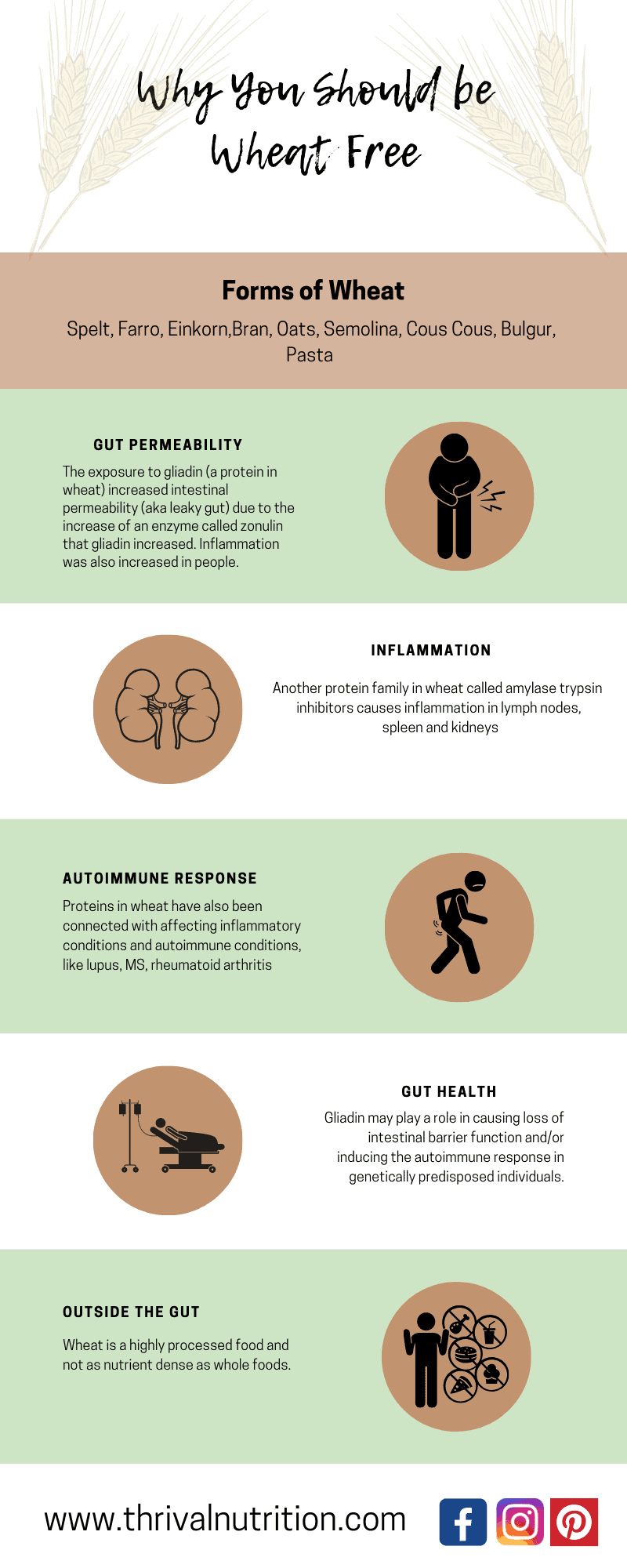
02 Oct Who Should Be Wheat Free?
Before I get started, I want to mention that you’ll hear me say “wheat free” throughout the blog. Wheat free also means gluten free. Gluten is a protein in wheat, but I don’t want to talk about JUST gluten because that’s only one protein that is found in wheat. There is SO much more about it that we shouldn’t just highlight gluten. Let’s answer that burning question you might be asking.
Who should be wheat free?
Based on the research + what I know about gut health, I think everyone would benefit being wheat free for the majority of the time! What you bring into the house and cook with and bake with, opting for a healthier nutrient dense option outside of wheat is ideal. For the special occasions where wheat can’t be avoided, like a birthday cake or wedding cake, indulging is totally fine, but having wheat in your diet on a regular basis may do more harm than good.
What the research says on wheat
Let’s talk about what the research says because I’m all about bring evidence based information to you. In the Journal of Nutrients, there was a great study that was done in four groups of different people of how wheat affected their digestive system.
These groups were:
- Celiac patients with ACTIVE disease
- Celiac patients that were in remission
- Non-celiac patients, but had a gluten sensitivity
- Non-celiac controls
Aka…ALL TYPES OF PEOPLE. In all types of people, the exposure to gliadin (a protein in wheat) increased intestinal permeability (aka leaky gut) due to the increase of an enzyme called zonulin that gliadin increased. Inflammation was also increased in people.
In 2016, a study done in the Scandinavian Journal of Gastroenterology, also showed that gliadin increased zonulin enzyme + intestinal permeability in both people – celiac and non-celiac patients. I also love that it mentioned CHRONIC gliadin exposure (eating a lot of wheat on a regular basis) downregulated a gene expression that kept the junctions in the intestines tight. I think this is a great thing to mention because while we may not feel the affects now, long term your gut function will be affected and gut issues can start “coming out of nowhere”.
I put that in quotes because things just don’t happen out of nowhere with your health (for chronic issues, not acute colds and such). Certain lifestyle and diet habits that doesn’t serve your body in a positive way can create a domino effect. This is why I tell people not to wait until you get a diagnosis or start feeling bad – start now and learn about your body + how to nourish it and take care of it.
The gut is where our health begins. It’s our interaction to the foods we eat, what we drink, how we fight pathogens, our immune system, everything. We need to make our GI a priority!
Another protein family in wheat called amylase trypsin inhibitors are also beginning to be studied due to what they do to the body OUTSIDE of the gut. The immune response that these proteins give can affect your lymph nodes, spleen and kidneys causing inflammation. They’ve also been connected with affecting inflammatory conditions and autoimmune conditions, like lupus, MS, rheumatoid arthritis.
Autoimmunity
Autoimmunity and digestive health goes hand in hand.
Gliadin may play a role in causing loss of intestinal barrier function and/or inducing the autoimmune response in genetically predisposed individuals.
Majority of our immune system, about 70%, is located inside the gut. So anytime, we have autoimmune issues we have to laser focus in on gut health + underlying infections + how we can use food as medicine. We want to have tight junctions and only allow nutrients + certain molecules inside the body, but when our junctions aren’t as tight, we start to allow bigger size molecules that shouldn’t be going inside our body. This can cause our immune system to go haywire + start going down a chronic inflammation pathway.
So, avoiding foods, like wheat, that affect the junctions like this is a huge priority.
Outside of gut health
Wheat is a really processed food. The wheat we have now isn’t anything like the wheat that our ancestors used to eat. The proteins in wheat have increased dramatically, it’s one of the most popular processed foods, it can be genetically modified + mostly not organic. I know there are organic brands, but it doesn’t change the gut health aspect of it.
My goal for clients is to aim for more nutrient dense foods.
If you’re struggling with autoimmunity or digestive issues, don’t hesitate to reach out to us + book a free call, so we can get you on the right track!



